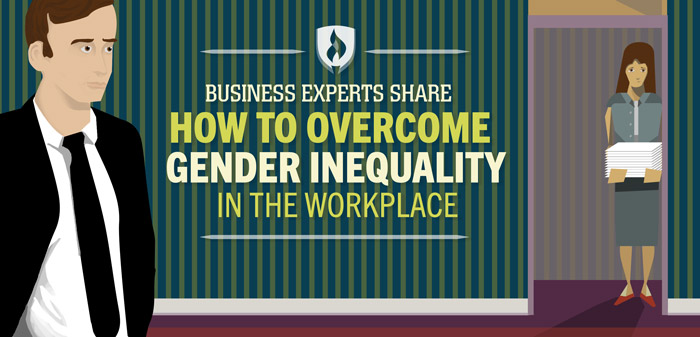Business Experts Share How to Overcome Gender Inequality in the Workplace
By Lauren Elrick on 08/24/2015

Gender inequality has been a hot topic on the minds of many for decades. Depending on where you live and with whom you interact, you probably already know that it remains a debated issue even in the 21st Century.
So what to do if you’re feeling the stealthy yet noticeable sweep of gender discrimination in the workplace? Perhaps you feel silly because you only notice it in trivial scenarios: who talks first; whose opinion is initially solicited; or the zeal with which vacation requests are accepted or rejected. Maybe none of this even strikes you as discrimination.
But gender inequality can take many forms in the workplace and there is a wide range of specific occurrences that can build a base for feelings of unfairness or favoritism. If you’re an ambitious, career-focused person who wants to make a difference in the organization, how do you climb the ladder in a place where people are treated differently?
We put together a list of commonly asked questions and connected with seasoned business pros to gather their opinions and advice on the topic.
What are some of the most common instances of gender inequality in the workplace?
Gender discrimination in the workplace is often seen when an employer creates an environment that’s unwelcoming or uncomfortable for a particular gender, according to Daniel Kalish, managing partner of HKM Employment Attorneys LLP. He says this can happen in the form of uttering inappropriate jokes, name calling or stereotypical comments about men or women.
Workplace discrimination happens among both genders. It can be glaringly obvious or difficult to spot, depending on the situation. A hostile work environment could be classified from issues with pay, job classification, vacation days or benefits, as well as other important work-related factors.
“Gender discrimination is rarely overt,” explains Jonathon Krol, employment attorney at Reminger Co., LPA, a civil defense litigation firm. “It often rears its head in the context of employment privileges and disciplinary measures.” For example, an employer may give perks or promotions to male employees that it does not afford to females; or, an employer might handle discipline differently for women versus men.
It’s important to note that there are several forms of workplace discrimination that are unlawful in America – such as pregnancy discrimination and sexual harassment. However, there are several scenarios that aren’t necessarily against the law, but still shouldn’t have to be dealt with.
How should you respond to workplace discrimination or harassment?
“Workplace harassment is something that exists no matter how progressive we think our culture is or is becoming,” explains Pauline Delaney, CPRW certified resume expert and career counselor. “Surprisingly, it exists for both genders.”
"Workplace harassment is something that exists no matter how progressive we think our culture is or is becoming."
The first step is to acknowledge that it’s happening. If you work in an environment where any sort of discrimination or harassment is occurring, it’s best to do something about it, even if it’s uncomfortable. Remaining silent will only allow the behavior to continue.
“It's difficult to find a safe way to deal with [workplace discrimination],” Delaney says. “There is not one blanket remedy suitable for all. The most important thing, however, is that you do something rather than nothing.”
The best thing to do is to talk to someone. Whether that means confronting the actual offender, a trusted supervisor or a member of your human resources department, articulating your concerns to someone else is important. You are the only one who knows the intricacies of your office, so determine the best person to approach and avoid spreading the gossip to everyone in the office.
Every workplace and situation is different, but one thing remains constant: you should never have to deal with being treated unfairly.
How can you ask for a raise or promotion?
There seems to be a common misconception that career-first individuals—whether men or women—are ruthless, cold and devoid of feeling. Stereotypes persist in pop culture today of difficult women and unsympathetic men leading Fortune 500 companies, driving luxury cars and inhabiting massive mansions. But the fact is, asking for raises, climbing the corporate ladder and reaching positions of leadership can be done without sacrificing one’s compassion and empathy.
When it comes to asking for a raise, the most important thing to remember is that you’re allowed to ask. And you should if you feel you deserve it.
Lauren Lembo is a business development director at Raxco Software, Inc. who says she fought for and obtained a five-figure raise during the first year of her job because she proved her worth. “If something is promised to you, fight for it,” she says. If you want something and believe you deserve it, she says to first demonstrate your worth, and then simply ask for it!
“Women and men absolutely should negotiate starting salaries and raises whenever they discover they are being paid below the market rate,” says Katie Donovan, a salary and career negotiation consultant and equal pay innovator. Here is one statement she recommends to do so: “I am very excited about the job offer; however, the pay seems low for the current market.”
How can you respectfully ask for a raise? “I was surprised to discover that I’m currently paid below the market value. How can we fix that?” according to Donovan.
There’s a time & place to speak up
There are a lot of resources available for those suffering from gender discrimination in the workplace. Here are some initial steps you can take to learn more:
- Familiarize yourself with the laws that address gender discrimination at work
- Research the impacts of prolonged gender discrimination in the workplace
- Investigate what you can do to help combat gender discrimination
The most important thing to remember is that you can and should do something about gender inequality in the workplace. Keeping quiet, ignoring it or diminishing it in your mind will only perpetuate the problem and enable the culprits to continue.
Do you have other advice for dealing with gender inequality in the workplace? Share your thoughts in the comments below!




